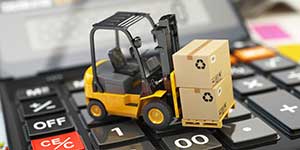5 Ways to Increase the Usable Life of Your Forklift
Regardless of the application, you want your forklift to deliver reliable performance for as long as possible. That’s why it’s important to ensure you’re using safe practices and performing regular maintenance on your machine. By performing the following tasks, you’ll maximize the usable life of your forklift. This will ensure that you’re getting reliable performance for as long as possible, maximizing ROI and value.

1. Keep to A 3-Month Oil Change Schedule
Though it’s easily overlooked, it’s important to ensure that your oil is changed every 3 months. By doing so, you’re reducing wear on your machine, increasing fuel economy, and keeping it at it’s rated capacity. If you’re neglecting oil changes, you could face issues like sludge build-up, corrosion, and even catalytic converter failure. Ensure that oil changes are on your quarterly maintenance list to prevent these problems from occurring.
2. Don’t Forget Preventative Maintenance
After the purchase of your forklift, you’ll need to establish a regular maintenance routine. This will ensure that you have a plan in place to keep your forklift in peak operating condition. By keeping your filters, fluids, forks, chains, and seals in good shape, you’re drastically cutting down on wear and tear. If you’re finding it difficult to make time for maintenance, it could be worth outsourcing it to a repair shop. This will allow you to focus on day-to-day tasks while your forklift receives the maintenance and repairs it needs.
3. Maintain Your Battery
Another commonly overlooked aspect of forklift maintenance is battery care. This is especially true for electric units. If you tend to charge your battery sporadically rather than keeping to a strict schedule, you could be damaging it. This damage often results in reduced battery efficiency, reducing run times and battery life. As a general rule, it’s often recommended to charge a traditional battery after a full day’s work. Alternatively, it should only be plugged in once it has lost at least 30% of the charge. If your forklift uses a lead-acid battery, you’ll also want to ensure that watering and equalization is performed every week. If your forklift is equipped with a lithium ion battery, you won’t need to perform these tasks. Just ensure that all connections remain in good shape and that you’re keeping your forklift charged.
4. Perform Regular Facility Cleaning and Maintenance
Your forklift is more likely to experience deterioration and performance issues if your facility isn’t kept clean. To reduce overall wear and tear on your equipment, ensure that your facility is kept free of debris and spills. Debris on floors is not only a safety hazard, but also a threat to the internals systems of your forklift. If this debris enters these systems, it can cause major damage to your unit. This will often put a stop to your operation until repairs are completed. By performing routine sweeping and cleaning, you’re eliminating the potential of encountering hazardous debris. This also helps to keep the work environment safer and easier to work in for operators and other personnel.
5. Ensure All Operators Are Well-Trained
This final tip doesn’t reference the forklift itself. Rather, it focuses on those that operate the equipment. Before anyone operates your forklift, it’s crucial that they are trained in safe practices and efficient operation. Most equipment damage is caused by user error or improper training. These errors can lead to crashes, tipping, and unsafe handling of loads. By ensuring that all personnel are trained and instructed properly, the risk of these incidents is greatly reduced. Well-trained operators also operate in a more efficient manner, reducing strain on the machine over time.
By following these 5 tips, you’ll see a significant increase in the usable life of your forklift. This allows you to get the most out of your equipment, maximizing ROI and overall value. Unfortunately, no forklift lasts forever. When it’s time to look into a new unit, our team at Lonestar Forklift is here to help. We also offer fleet management programs that allow us to determine your optimal turnover time. This ensures that you’re always using the best equipment for the job. Contact us today to learn more about our services and solutions!

